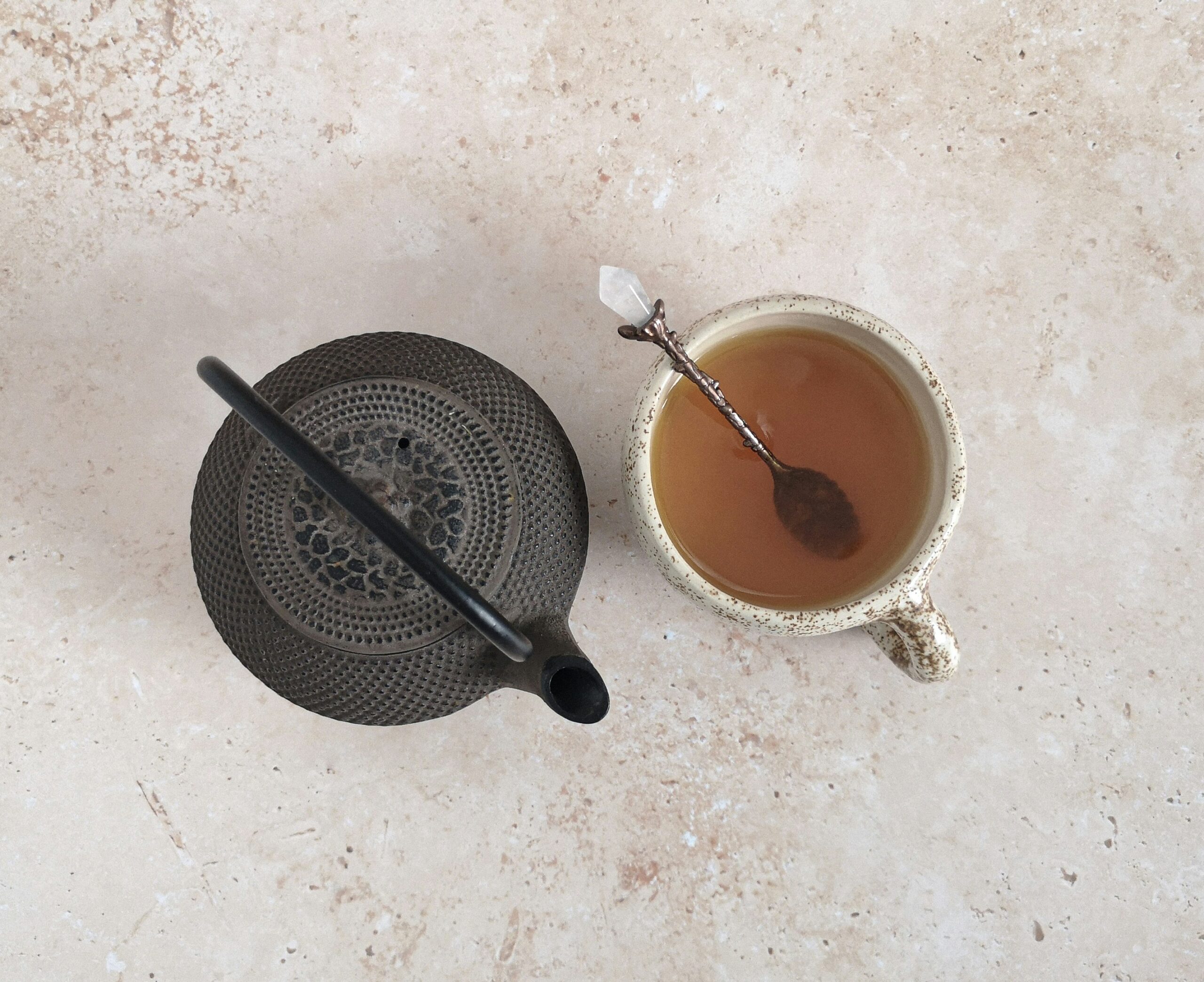Discovering the best herbs for yoni oil can be a game-changer for your vaginal self-care routine. Certain herbs like calendula, lavender, and chamomile are known for their soothing and healing properties. These natural ingredients can help maintain the health of your vagina and enhance overall wellness.

You can combine these herbs with essential oils like tea tree oil, which has antimicrobial properties, or lavender oil, which is known for its calming effects. Including these herbs and essential oils in your yoni oil not only supports vaginal health but can also contribute to a more refined self-care routine.
When making your yoni oil, it’s important to use quality carrier oils like coconut oil or sweet almond oil. They help in diluting the essential oils and herbs, making them safe to use on sensitive areas. With the right ingredients, you can create a yoni oil that supports your body’s natural balance and contributes to a feeling of overall well-being.
Key Takeaways
- Choosing herbs like calendula and lavender is beneficial for yoni oil.
- Using essential oils like tea tree oil can enhance vaginal health.
- Quality carrier oils are necessary for safe and effective yoni oil.
The Basics of Yoni Oil

Yoni oil, often made from essential oils and herbs, aims to support the delicate area and promote wellbeing. Understanding what yoni oil is and why it’s important can help you make an informed choice.
Defining Yoni Oil
Yoni oil is a natural product crafted for the care of your intimate area. Typically, it includes a blend of essential oils and herbs known for their calming and healing properties. These may include lavender, tea tree, and chamomile oils, among others.
These oils are chosen for their gentle nature and ability to support skin health. They can help maintain natural moisture, reduce discomfort, and keep the area fresh. This blend of ingredients ensures the yoni stays balanced and healthy, addressing concerns like dryness and irritation.
Using yoni oil regularly can promote overall comfort and hygiene. It’s important to note that the oil is meant for external use only. Before using, it’s advisable to do a patch test to ensure there are no adverse reactions.
The Importance of Self-Care
Taking care of your intimate health is a significant part of overall well-being. Yoni oil can be an essential part of this self-care routine. The herbs and essential oils combined in yoni oil provide natural benefits that support comfort and cleanliness.
Practicing self-care with products like yoni oil can help you feel more in tune with your body. The application process itself can be a soothing ritual, offering a moment of calm and self-connection. It also ensures that you are regularly checking in on your intimate health.
Incorporating yoni oil into your routine can make a noticeable difference. The benefits include soothing sensitive skin, maintaining natural balance, and providing a refreshing feeling. Regular use can also help prevent minor issues like irritation and dryness.
Using products made from natural ingredients, such as yoni oil, underscores the importance of choosing gentle, effective care for your body. This practice can enhance your overall sense of well-being and put you in a better position to enjoy daily life.
Choosing Essential Oils and Herbs

When selecting essential oils and herbs, it is important to consider their healing properties, especially for feminine wellness. This section outlines key essential oils and medicinal herbs beneficial for yoni oil formulations.
Properties of Essential Oils
Essential oils have unique properties that can support feminine health. Lavender is well-known for its calming effect and can soothe skin irritation. Tea tree oil has antimicrobial properties, making it effective against bacterial and fungal infections.
Rose oil is another excellent choice, offering hydrating and anti-inflammatory benefits. Chamomile is soothing and can help reduce inflammation and redness. Calendula has healing and regenerative properties, promoting healthy skin. When choosing oils, ensure they are pure and high-quality to achieve the best results.
Herbs for Feminine Wellness
Herbs have been used for centuries to support feminine health. Sage is beneficial for its antibacterial properties and can help maintain a healthy balance of bacteria. Rosemary improves circulation and has antifungal qualities. Yarrow is known for its ability to heal tissues and reduce inflammation.
Mugwort helps regulate menstrual cycles and can be calming. Calendula can soothe and repair skin tissues. Using these herbs in yoni oil can enhance overall wellness by addressing specific feminine health concerns. Ensure the herbs are organic and properly processed to preserve their medicinal qualities.
Benefits for Vaginal Health

Using herbs in yoni oil can offer several benefits for vaginal health. Key advantages include moisturising and soothing effects, as well as antimicrobial and healing properties.
Moisturising and Soothing
Herbs like calendula and chamomile are well-known for their moisturising properties. They help maintain natural vaginal lubrication and prevent dryness. Calendula is rich in anti-inflammatory compounds which can soothe irritation and discomfort.
Chamomile has been used to relax muscles and calm irritated skin. It’s especially helpful for relieving itching and redness. Regular use of these herbs can make vaginal tissues more supple and balanced.
Antimicrobial and Healing
Tea tree oil and neem are excellent for their antimicrobial benefits. They fight off bacteria and fungi that cause infections. Tea tree oil is known for its broad-spectrum antimicrobial activities and can help keep the vaginal area clean.
Neem also has strong antibacterial and antifungal properties. It promotes healing of minor cuts or abrasions. Incorporating these herbs in yoni oil aids in preventing infections and promotes faster recovery from any minor injuries.
Using a mix of these herbs can significantly improve vaginal health, providing protection and helping to maintain a healthy balance.
Application and Usage

Understanding how to properly use yoni oils can enhance their benefits. This section will walk you through the steps for applying yoni oils and suggest a daily routine to follow.
How to Apply Yoni Oils
To apply yoni oils, start by cleaning your hands and the vaginal area. Ensure your yoni oil is at room temperature. You can warm it slightly by rubbing a few drops between your palms.
Lie down in a comfortable position. Use a dropper or your fingers to apply a few drops of oil around the vaginal opening and gently inside. Be gentle to avoid friction and ensure even distribution.
Massaging the oil into the skin can improve absorption. Apply light pressure and use circular motions. This can also help with relaxation and self-care.
Recommended Routine
Using yoni oils regularly can maintain vaginal health. Apply the oil once or twice a day, preferably after a shower when your skin is clean and pores are open.
To make it part of your routine, incorporate it into your bedtime self-care practices. Use soft, natural fabrics to avoid irritation. Maintain hygiene and store the oil in a cool, dry place.
If you experience discomfort or irritation, discontinue use and consult a healthcare professional. Safe usage is essential to prevent infections and ensure the oil’s benefits.
Following these steps can enhance lubrication and reduce friction, supporting overall vaginal health.
Carrier Oils for Yoni Oil
Choosing the right carrier oils for yoni oil is essential, especially for sensitive skin. Some oils stand out for their benefits and suitability.
Suitability for Sensitive Areas
When selecting carrier oils, it’s crucial to consider how gentle they are on sensitive skin. Some oils are especially mild, reducing the risk of irritation. Coconut oil is a popular choice due to its natural antibacterial properties and soothing qualities. It is absorbed easily and leaves the skin feeling soft.
Similarly, jojoba oil mimics the skin’s natural sebum, making it less likely to cause a reaction. It is non-comedogenic, meaning it won’t clog your pores, which is great for sensitive areas.
Almond oil is another favoured option. It is rich in vitamins A and E, promoting healthy skin without causing irritation. Its lightweight texture helps in quickly delivering the benefits of any herbs mixed into the yoni oil. Always patch-test any new oil to ensure it suits your skin.
Popular Carrier Oil Options
Several carrier oils are commonly used in yoni oil preparations due to their beneficial properties. Coconut oil is well-loved for its moisturising and antimicrobial properties. These traits make it perfect for maintaining a healthy yoni area.
Jojoba oil stands out because it balances the skin’s natural oils. Its hypoallergenic nature makes it a safe option for almost everyone.
Almond oil offers both nourishment and hydration. Its high vitamin E content helps soothe and repair skin, making it a top choice in many yoni oil recipes.
You can also explore other carrier oils like grapeseed oil or avocado oil. Each has unique benefits but ensure to choose oils that are cold-pressed and pure for the best results.
D.I.Y. Yoni Oil Recipes

Creating your own yoni oil at home can be a rewarding and beneficial experience. You will learn how to mix different herbs to achieve soothing, aromatic blends and the best way to dry and store these herbs.
Creating Your Blend
Start with a clean workspace. Use dried herbs for your yoni oil as they prevent bacterial growth. Common herbs include lavender, rose petals, calendula, and chamomile. Measure about a tablespoon of each herb. Place them in a sterilised glass bottle.
Next, pour about 1 cup of your chosen carrier oil over the herbs. Popular options are sweet almond oil, jojoba oil, or coconut oil. Ensure the herbs are fully submerged.
Seal the bottle tightly and place it in a warm, dark spot for 4-6 weeks. Shake the bottle gently every few days to help the infusion process.
After the infusion period, strain the oil using a cheesecloth or fine strainer into a clean glass bottle with a dropper. This helps keep the oil pure and free from solid particles.
Drying Herbs and Storage
Drying herbs properly is essential to extend their shelf life and potency. Spread the freshly picked herbs on a clean, dry surface in a single layer. Allow them to air dry in a warm, ventilated area, away from direct sunlight, for about 1-2 weeks.
Once dried, store the herbs in airtight containers, preferably glass jars, to maintain their aromatic properties. Keep these jars in a cool, dark place.
Regularly check the herbs for any signs of moisture or mold. Proper storage ensures that your herbs remain fresh and effective for your homemade yoni oil recipes.
Adverse Reactions and Safety
Using herbs for yoni oil can offer natural benefits, but it’s important to be aware of potential side effects and follow safe practices to avoid any adverse reactions.
Potential Side Effects
Some herbs may cause side effects when used in yoni oil. Common issues include skin irritation or allergic reactions. It’s recommended to test a small amount on your skin before full use.
Herbs like clove or tea tree oil, which have strong antiseptic properties, might cause burning sensations if used in high concentrations. Others may influence the natural flora of the yoni, leading to imbalances or discharge.
Always seek herbs that are noted for their gentleness and compatibility with sensitive areas. Ayurvedic herbs are often preferred, as they are traditionally considered safer for intimate use.
Safe Practices
To ensure safety, always use herbs and oils that are pure and free from additives. Opt for ingredients that are organic and have been tested for contaminants.
Dilute essential oils in a carrier oil before applying them to avoid irritation. Generally, a few drops of essential oil per tablespoon of carrier oil is a safe ratio.
Consult with a healthcare provider or an Ayurveda expert familiar with sanskrit terms for a better understanding of safe herb usage.
Store prepared yoni oil in a cool, dark place and use clean, sterilised containers to avoid contamination.
Following these practices helps ensure that your use of yoni oil is both effective and safe.
Enhancing Intimacy and Wellness

Yoni oils can play a significant role in enhancing both intimacy and wellness. They can help increase feelings of love and desire while supporting the health of your reproductive organs.
Yoni Oils for Intimate Moments
Yoni oils made with certain herbs can enhance intimacy and desire. Clary sage is known to increase libido and improve mood. Lavender is another herb that can relax the mind and body, paving the way for closer connections.
Using these oils during intimate moments can increase blood flow to your reproductive organs. This can make you feel more connected and in tune with your partner.
Emotional and Physical Benefits
Emotional wellbeing is crucial for a healthy intimate life. Herbs like chamomile in yoni oils can reduce stress and anxiety, helping you feel more emotionally balanced.
Physically, oils with ingredients like calendula can promote healthy skin and soothe any irritations in your intimate areas. This dual action can support overall wellness, helping you feel your best both emotionally and physically.
For more information, you can refer to diverse complementary therapies for fertility-related emotional and physical wellbeing and an alternative view on endometriosis.
Menstrual and Postpartum Care
Yoni oil can be particularly beneficial during menstruation and the postpartum period. It offers natural remedies to alleviate discomfort and promote healing.
Alleviating Discomfort During Menstruation
During menstruation, many experience cramps, bloating, and mood swings. Certain herbs in yoni oil can help ease these symptoms. For instance, lavender and clary sage essential oils are known for their calming effects and can assist in reducing cramps and stress.
Peppermint oil is another good option. It has cooling properties that can help soothe cramps. Additionally, ginger can improve circulation, which may relieve pain. These herbs help balance hormones and improve overall wellbeing during your menstrual cycle.
Using these herbs, you can create a soothing blend for your yoni oil to use during menstrual discomfort.
Postpartum Healing Properties
The postpartum period is crucial for recovery and healing. Yoni oil infused with herbs can aid in this process. Herb-infused oils like calendula and comfrey can promote tissue repair and reduce inflammation. Calendula is known for its skin-healing properties, which can be beneficial for perineal tears.
Lavender and tea tree oil have antimicrobial properties that help prevent infections, while chamomile offers a soothing effect on irritated tissue.
Applying yoni oil with these herbs can support faster healing and provide comfort after childbirth.
Consider making a blend of these herbs to support your postpartum recovery. For more detailed information, you can check out related studies on fertility-related emotional and physical wellbeing.
A Guide to Preventative Care

Proper use of yoni oil can help in preventing infections and irritations. It also plays a crucial role in maintaining the pH balance, which is essential for vaginal health.
Preventing Infections and Irritations
To avoid infections like yeast infections and bacterial vaginosis, it’s important to use herbs with antibacterial and antifungal properties in yoni oil. Tea tree oil is effective against various infections due to its strong antiseptic properties. Lavender oil can help soothe irritations and reduce itching.
Using yoni oil regularly can create a protective barrier, reducing the chance of infections. Always ensure the oil is applied externally and not placed inside the vagina to prevent further complications. It’s also essential to test a small amount on your skin before full application to avoid allergic reactions.
Proper hygiene practices are crucial. Wash your hands before applying the oil and ensure the area is clean. Avoid using harsh soaps or douches, as they can disrupt the natural flora and cause irritation.
Balancing pH Levels
Maintaining the correct pH level is key to vaginal health. A balanced pH prevents harmful bacteria from thriving and reduces the risk of infections. Herbs such as calendula and chamomile are beneficial in yoni oil for their soothing effects and can help maintain pH levels.
Regular use of yoni oil with ingredients like apple cider vinegar can help in balancing the vaginal pH. It’s vital to dilute it properly to prevent irritation.
A proper diet rich in probiotics, such as yoghurt, also supports a healthy pH balance. Staying hydrated is another simple yet effective way to maintain the right pH levels.
External Care and Shaving
Proper external care is key to maintaining healthy skin, especially after hair removal. Using appropriate treatments can help reduce irritation, ingrown hairs, and razor bumps.
Soothing Skin After Hair Removal
After shaving or waxing, your skin can become irritated. To soothe this irritation, consider using yoni oil infused with calming herbs like chamomile and calendula. These herbs have anti-inflammatory properties that can help reduce redness and swelling.
For ingrown hairs, using a gentle exfoliant before and after hair removal can be beneficial. Products containing tea tree oil or lavender can help as they have antibacterial properties that prevent infection. Apply a cold compress to the shaved area to reduce inflammation and prevent razor bumps.
Moisturising the skin with a blend of aloe vera and jojoba oil can provide hydration and soothe any irritation.
Maintaining External Hygiene
Maintaining external hygiene is essential for feminine health. After hair removal, cleansing the external areas like the mons pubis and labia with a gentle, pH-balanced wash can help prevent infections.
Avoid using harsh soaps or anything with strong fragrances as they can disrupt the natural flora. Using yoni oil with herbs such as neem and rosemary can help keep the external area clean due to their antibacterial properties.
Wearing cotton underwear and avoiding tight clothing can prevent irritation and allow the skin to breathe. Make sure to change out of sweaty clothing as soon as possible, especially after exercising. Proper hygiene practices can help avoid many common issues related to hair removal and external care.



Comments +